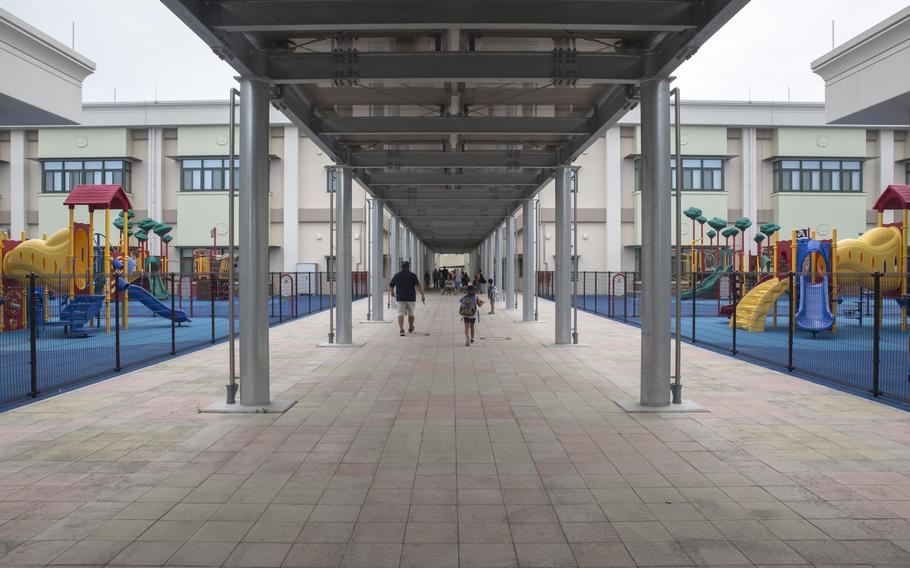
Students and parents walk between playground equipment at Matthew C. Perry Primary School and Iwakuni Elementary School at Marine Corps Air Station Iwakuni, Japan, Aug. 30, 2017. M.C. Perry is first in line to offer universal prekindergarten to U.S. military families stationed overseas. (Carlos Jimenez/U.S. Marine Corps)
American 4-year-olds in western Japan will be able to go to school this fall as part of a new plan that could eventually benefit 6,100 children across the Department of Defense Education Activity, according to school officials.
M.C. Perry Primary School in Iwakuni is first in line to offer universal prekindergarten to U.S. military families stationed overseas, DODEA said.
All eligible “military-connected” children at Marine Corps Air Station Iwakuni who turn 4 on or before Sept. 1 may enroll in prekindergarten, according to a June 6 announcement posted on the school’s website.
The announcement says school begins at 7:55 a.m. Monday to Friday and students are dismissed at 1:30 p.m. every day except Thursday, when the day ends at 1:15 p.m. Education, health, nutrition, family involvement and social services comprise the program, according to the school’s website.

Students at M.C. Perry Primary School participate in a career camp at the end of May 2023. The school is slated to be the first DODEA school to offer universal prekindergarten as the agency looks to expand its preschool offerings overseas. (M.C. Perry Primary School/Facebook)
DODEA now is awaiting funding approval to expand its preschool offerings.
President Joe Biden’s proposed 2024 budget includes $66.4 million in universal prekindergarten funds for students in 60 military communities served by DODEA schools worldwide, agency spokesman Will Griffin said in an email earlier this month.
Universal preschool generally sets age as the sole criterion, rather than limiting eligibility to income or other factors. DODEA officials have said providing all eligible families access to prekindergarten will build a solid foundation for later success in college and careers while supporting military and family readiness.
In a separate proposal, the White House in its 2024 budget wants to fund a federal-state partnership that provides universal, free preschool to all 4-year-olds in the setting of a parent’s choice, such as public schools, with child-care providers or through Head Start.
Growing data indicates that preschool may benefit children throughout their school years and beyond.
A study published in May 2021, for example, on the long-term effects of universal preschool in Boston by the National Bureau of Economic Research found that 54% of preschoolers ended up going to college — about eight percentage points higher than their peers who didn’t go to preschool.
Researchers said they were intrigued to see that outcome coupled with no correlation to higher standardized test scores, according to a report on the study on National Public Radio. That combination indicates to researchers that preschool can have behavioral or socio-emotional benefits, such as improving discipline or motivation, they told NPR.
For military families, especially those overseas, offering a preschool program could help alleviate chronic on-base child-care shortages, military family advocates have said.
DODEA is using its 2023 budget to pay for prekindergarten for about 95 to 100 students at Iwakuni, where existing classrooms and facilities required minimal changes to meet requirements, Griffin said.
Early implementation at Iwakuni allows DODEA to “test and validate procedures and plans” as it develops a wider rollout, Griffin added.
If funding is approved, DODEA would strive to add more preschools next school year in the first phase of a three-phase rollout, Griffin said. Locations for each phase haven’t been determined and some areas may require building construction or significant renovations, he said.
To support universal prekindergarten, DODEA expects to hire more than 440 full-time employees, to include certified teachers, paraprofessional aides and substitute teachers, Griffin said.
Part-day prekindergarten already is available at all DODEA stateside installations, to include on Guam and Puerto Rico, Griffin said. Universal prekindergarten will expand all half-day preschools to full day and expand access to all eligible families overseas, he said.
Once the program is available, students must be 4 years old by Sept. 1 to attend in the current school year.